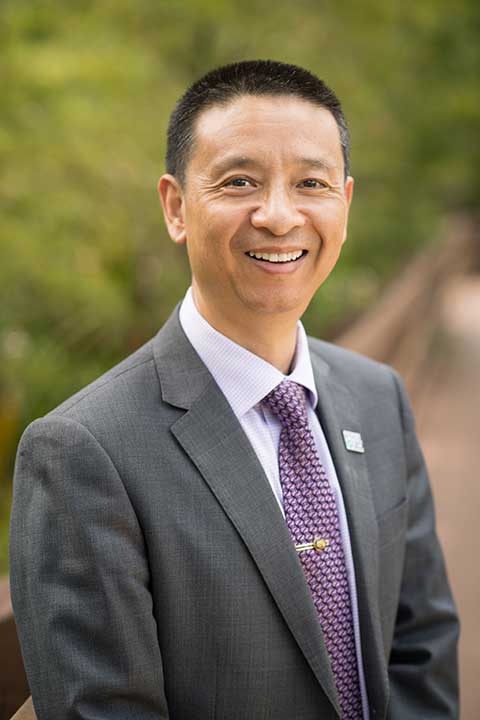Specialists in educational technology are urging international collaboration as teachers around the world grapple with new challenges presented by the wide-scale shift to distance learning. While the coronavirus situation imposes unprecedented hurdles, it also spurs opportunities to research and promote quality education, and effective and ethical use of technology for lifelong learning.

Those were some of the key takeaways from a webinar that FGCU Educational Technology Professor Charles Xiaoxue Wang recently hosted through the Association for Educational Communications and Technology (AECT). The global organization of instructional designers, educators and professionals has thousands of members who provide leadership and advise policy makers in order to sustain a continuous effort to enrich teaching and learning. Wang became involved with the association in 2000 as a doctoral student in instructional systems at Pennsylvania State University and now serves on the AECT Executive Committee.
“This was the first webinar with international perspectives where we had panelists from Australia, Canada, China, Germany and Japan to introduce their higher-ed situation and strategies they are taking to cope with remote teaching and online learning,” Wang said.
The impact of the pandemic across all walks of life brings multifaceted challenges and calls for multifaceted solutions, according to Wang. In addition to addressing short-term online solutions for current learning and teaching needs, education professionals need to take a systemic, strategic approach to an uncertain future.
“This is such a great opportunity to promote online learning across all academic levels,” Wang said. “It breaks down the walls of schools and expands learning to online, driving it anywhere and everywhere for our kids. Learning to learn online effectively becomes an obvious essential skill for lifelong learning.”
Panelists for the “International and Cultural Perspectives on Teaching, Learning, and Technologies in Response to the COVID-19 Virus”webinar were based in Australia, Canada, China, Germany and Japan, but AECT members from Saudi Arabia, Nigeria and other countries joined in and offered comments and questions through real-time chat via Zoom.
Although the benefits of technology in online learning are fully embraced in many countries to meet the needs of learners at different ages and in different fields, not all institutions are well prepared with technology infrastructure, such as WIFI coverage and bandwidth, or for providing equal access for all students. Such challenges have become more obvious and severe as a result of the pandemic, the AECT webinar made clear.
For instance, Dr. Camille Dickson-Deane, participating from Australia, pointed out that some of her students don’t have access to online learning and have to drive three hours one way to study on campus and stay on campus three days week. Sending them home is basically cutting them off from online learning, she said.
Other challenges panelists discussed include teaching lab work and performance-based skills, evaluating student internships and proctoring online tests. Dr. Dirk Ifenthaler from Germany suggested borrowing effective teaching practices from universities where every course is online, such as Australian Open University, China Open University and Turkey Open University.
Copyright is another issue. Not all the textbooks and videos can be placed online immediately without any further cost to students or institutions.
“Things are getting better,” Wang said. “For example, Audible, an Amazon company, just released its audio books without charging a dime and without an app.”
The AECT plans additional webinars for K-12 teachers and higher education professionals to share information and ideas. They will be recorded and available online. The association’s website also initiated a crowdsourced list for sharing expert resources such as articles, videos and slides as well as recommendations for best practices for remote teaching.
For his part, Wang was preparing to participate in another webinar, “How to Facilitate Online Learning with K-12 Students,” hosted by the Smart Technology Research Institution at Beijing Normal University, Beijing, China. Dr. Amanda Rose, an award-winning FGCU alumna who teaches at Dunbar High School in Fort Myers, was scheduled to join him in this international virtual meeting featuring panelists from China, the Middle East and Europe.
As a professor of educational technology with expertise in designing online instructions, he also had been helping other FGCU faculty, staff and students make the transition to remote learning. He has been sharing a one-page model he developed calls CAFÉ (Content, Activities, Facilitations and Evaluation) to assist professors transforming their classroom-based curriculum. Tips for making the most of Canvas features are included.
Wang’s collaborative efforts have extended off campus, too.
“I have worked with my students who are local schoolteachers to develop their online instructions,” he said. “At the same time, I am working with my graduate student in writing an article offering tips for teachers, parents and kids on learning online during school closure.”